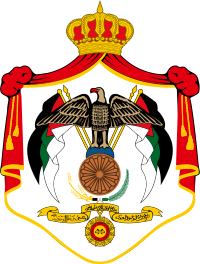
Back الانتخابات في الأردن Arabic জর্ডানে নির্বাচন Bengali/Bangla Εκλογές στην Ιορδανία Greek Élections en Jordanie French
 |
|---|
|
|
|
|
Elections in Jordan are for the lower house, known as the House of Representatives, of the bicameral parliament of Jordan, as well as for local elections. They take place within a political system where the King has extensive legislative and executive powers, retaining ultimate political control. The Prime Minister is selected by the King, the PM is then free to choose his own Cabinet. The parliament has quotas: three seats for Circassians and Chechens, nine for Christians and fifteen for women. The electoral system favours rural tribes and those of East Bank origin over urban areas that are primarily inhabited by those of Palestinian descent.
The first general election was held during the Emirate of Transjordan in 1929. Even after Jordan gained independence in 1946, British influence caused elections to be held under block voting. Just three months into an elected government experiment in 1956, the former King Hussein then dismissed that government, declaring martial law and banning political parties. This lasted until general elections were reintroduced in 1989 after unrest over price hikes spread in southern Jordan. The 1989 general election under block voting saw opposition Islamist parties win 22 out of 80 seats in the House of Representatives. The electoral system was then changed in 1992 to a single non-transferable vote system, which became known as “one-man one-vote”, in order to suppress Islamist representation. Opposition parties back then including the Muslim Brotherhood’s Islamic Action Front (IAF) often boycotted elections due to the new law, even though political parties were relegalized and martial law was lifted.
The 2011–12 Jordanian protests that occurred as part of the Arab Spring led to calls for political reform. Some reforms were introduced prior to the 2013 general election, which included the creation of an Independent Electoral Commission. The changes were however deemed insufficient by many opposition parties, and they continued their boycott. Large-scale reforms were put into place for the 2016 general election and the 2017 local elections. Opposition parties including the IAF have ended their boycott of the elections in 2016 after proportional representation was introduced, and together with their allies managed to win 16 seats out of 130, after they were expecting 20-30 seats. Proportional representation is seen as the first step toward establishing parliamentary governments in which parliamentary blocs, instead of the king, choose the prime minister.[1] However, the underdevelopment of political parties in Jordan have slowed such moves.[1]
- ^ a b "Stage not mature for parliamentary gov't, analysts say; gov't says road paved". The Jordan Times. 5 June 2016. Archived from the original on 10 October 2017. Retrieved 7 January 2018.
© MMXXIII Rich X Search. We shall prevail. All rights reserved. Rich X Search